中考英语知识点复习 专题十一:情态动词
初中情态动词知识点归纳
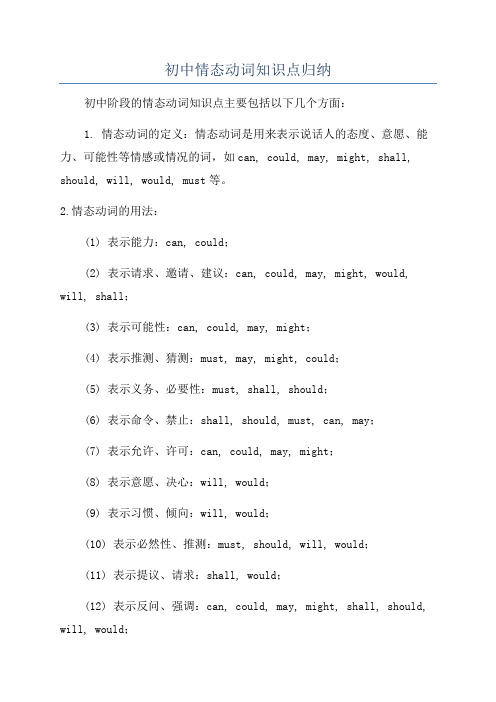
初中情态动词知识点归纳初中阶段的情态动词知识点主要包括以下几个方面:1. 情态动词的定义:情态动词是用来表示说话人的态度、意愿、能力、可能性等情感或情况的词,如can, could, may, might, shall, should, will, would, must等。
2.情态动词的用法:(1) 表示能力:can, could;(2) 表示请求、邀请、建议:can, could, may, might, would, will, shall;(3) 表示可能性:can, could, may, might;(4) 表示推测、猜测:must, may, might, could;(5) 表示义务、必要性:must, shall, should;(6) 表示命令、禁止:shall, should, must, can, may;(7) 表示允许、许可:can, could, may, might;(8) 表示意愿、决心:will, would;(9) 表示习惯、倾向:will, would;(10) 表示必然性、推测:must, should, will, would;(11) 表示提议、请求:shall, would;(12) 表示反问、强调:can, could, may, might, shall, should, will, would;(13) 表示承诺、保证:will, would;(14) 表示否定:can't, couldn't, may not, mustn't, shouldn't, won't, wouldn't。
3.情态动词的句型:(1) 能力句型:主语 + can/could + 动词原形;(2) 请求句型:主语 + can/could/may + 动词原形 + 其他;(3) 建议句型:主语 + should + 动词原形;(4) 命令句型:主语 + must/should + 动词原形 + 其他;(5) 允许句型:主语 + can/could/may + 动词原形 + 其他;(6) 必要性句型:主语 + must/should + 动词原形;(7) 意愿句型:主语 + will/would + 动词原形;(8) 可能性句型:主语 + can/could/may/might + 动词原形;(9) 推测句型:主语 + must/may/might + 动词原形;(10) 禁止句型:主语 + mustn't/shouldn't + 动词原形。
初中英语知识点归纳情态动词的用法
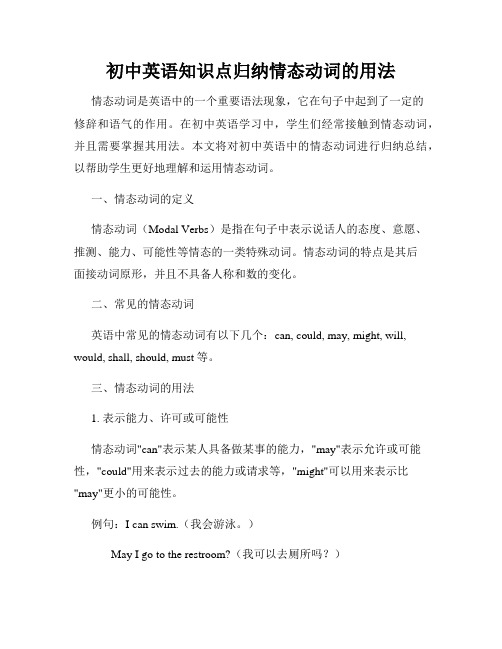
初中英语知识点归纳情态动词的用法情态动词是英语中的一个重要语法现象,它在句子中起到了一定的修辞和语气的作用。
在初中英语学习中,学生们经常接触到情态动词,并且需要掌握其用法。
本文将对初中英语中的情态动词进行归纳总结,以帮助学生更好地理解和运用情态动词。
一、情态动词的定义情态动词(Modal Verbs)是指在句子中表示说话人的态度、意愿、推测、能力、可能性等情态的一类特殊动词。
情态动词的特点是其后面接动词原形,并且不具备人称和数的变化。
二、常见的情态动词英语中常见的情态动词有以下几个:can, could, may, might, will, would, shall, should, must等。
三、情态动词的用法1. 表示能力、许可或可能性情态动词"can"表示某人具备做某事的能力,"may"表示允许或可能性,"could"用来表示过去的能力或请求等,"might"可以用来表示比"may"更小的可能性。
例句:I can swim.(我会游泳。
)May I go to the restroom?(我可以去厕所吗?)Could you please open the window?(你可以帮我开下窗户吗?) It might rain tomorrow.(明天可能会下雨。
)2. 表示推测、猜测情态动词"must"表示对某事有一定推测,"shall"用来询问并提供建议,"would"则表示某人愿意做某事。
例句:She must be busy.(她一定很忙。
)Shall we go to the movies tonight?(我们今晚去看电影好吗?) Would you like a cup of tea?(你想喝杯茶吗?)3. 表示义务、建议和可能性情态动词"should"表示建议或应该做的事情,"ought to"表示某事理应如此,"will"可以用来表示请求或承诺,"can"也可以表示请求。
最新版-英语情态动词专项复习

we can see his name on it .
7
4. need (需要) 既可做实义动词也可做情态动词 1)实义动词 need to do sth 需要做某事
Eg: I need to buy a big house . --- Do you need to buy a big house ? --- Yes , I do . No, I don’t . He needs to borrow a map . --- Does he need to borrow a map ?
Yes ,you may. No, you mustn’t. No, you can’t.
Yes, you must. No, you needn’t. No you don’t have to
Yes, you must. No, you needn’t
1.Must I take the keyboard to the office now ?
2) 情态动词 need do sth 需要做某事 Eg: I need buy a big house .
8
5. have to
不得不
Eg: It’s eleven o’clock . I have to go now .
He has to finish the work first .
请注意: I don’t have to go now .
--No, you __C___.Tomorrow is Saturday .You
may get up later.
A mustn’t
中考英语情态动词考点总结与归纳
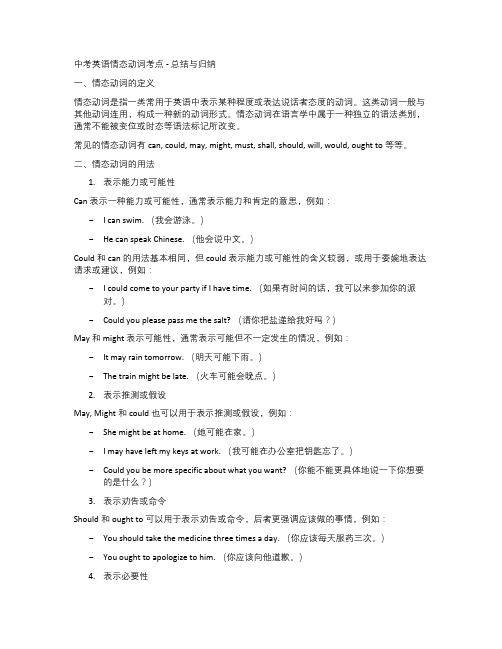
中考英语情态动词考点 - 总结与归纳一、情态动词的定义情态动词是指一类常用于英语中表示某种程度或表达说话者态度的动词。
这类动词一般与其他动词连用,构成一种新的动词形式。
情态动词在语言学中属于一种独立的语法类别,通常不能被变位或时态等语法标记所改变。
常见的情态动词有 can, could, may, might, must, shall, should, will, would, ought to 等等。
二、情态动词的用法1.表示能力或可能性Can 表示一种能力或可能性,通常表示能力和肯定的意思,例如:-I can swim. (我会游泳。
)-He can speak Chinese. (他会说中文。
)Could 和 can 的用法基本相同,但 could 表示能力或可能性的含义较弱,或用于委婉地表达请求或建议,例如:-I could come to your party if I have time. (如果有时间的话,我可以来参加你的派对。
)-Could you please pass me the salt? (请你把盐递给我好吗?)May 和 might 表示可能性,通常表示可能但不一定发生的情况,例如:-It may rain tomorrow. (明天可能下雨。
)-The train might be late. (火车可能会晚点。
)2.表示推测或假设May, Might 和 could 也可以用于表示推测或假设,例如:-She might be at home. (她可能在家。
)-I may have left my keys at work. (我可能在办公室把钥匙忘了。
)-Could you be more specific about what you want? (你能不能更具体地说一下你想要的是什么?)3.表示劝告或命令Should 和 ought to 可以用于表示劝告或命令,后者更强调应该做的事情,例如:-You should take the medicine three times a day. (你应该每天服药三次。
中考英语情态动词总结

中考英语情态动词总结情态动词是一类特殊的动词,表达了说话人的态度、意愿、能力、推测等情态。
常见的情态动词有can, could, may, might, must, shall, should, will, would, ought to等。
下面是关于这些情态动词的总结:1. can: 表示能力、许可。
常用于肯定句和疑问句中,一般不能用于否定句。
例如:"I can swim."(我会游泳。
)"Can you help me?"(你能帮我吗?)2. could: 表示过去的能力、许可,也可以用于请求或建议。
例如:"When I was young, I could run very fast."(我小时候跑得很快。
)"Could you please pass me the salt?"(你能帮我递一下盐吗?)4. might: 表示较小的可能性,常用于虚拟语气句中。
例如:"If it doesn't rain, we might go for a picnic."(如果不下雨,我们可能去野餐。
)5. must: 表示必须、推测的肯定。
例如:"You must finish your homework before you go out."(你必须在出去之前完成作业。
)"It's already 9 o'clock. He must be at home."(已经9点了,他一定在家。
)6. shall: 表示将来的意愿,用于第一人称(I, we)的疑问句中。
例如:"Shall we go to the park tomorrow?"(明天我们去公园吧?)7. should: 表示应该,常用于建议、请求中。
例如:"You should take a break."(你应该休息一下。
中考考点_情态动词知识点汇总
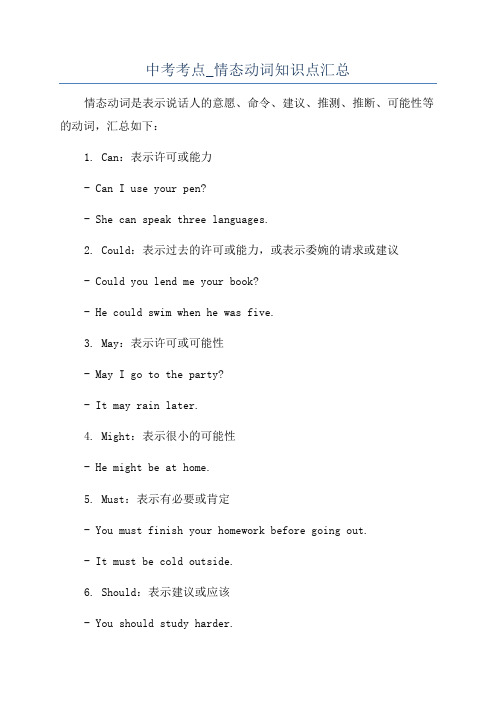
中考考点_情态动词知识点汇总情态动词是表示说话人的意愿、命令、建议、推测、推断、可能性等的动词,汇总如下:1. Can:表示许可或能力- Can I use your pen?- She can speak three languages.2. Could:表示过去的许可或能力,或表示委婉的请求或建议- Could you lend me your book?- He could swim when he was five.3. May:表示许可或可能性- May I go to the party?- It may rain later.4. Might:表示很小的可能性- He might be at home.5. Must:表示有必要或肯定- You must finish your homework before going out.- It must be cold outside.6. Should:表示建议或应该- You should study harder.7. Shall:表示征求意见或提出建议,或用于第一人称的疑问句中- Shall we go to the movies tonight?- What shall I do with this problem?8. Will:表示意愿、意愿、习惯或将来的行动- I will help you with your homework.- She will be here in a few minutes.9. Would:表示过去的意愿或习惯,或表示委婉的请求、邀请或建议- Would you like some tea?- He would always go for a walk after dinner.10. Ought to:表示应该,常用于表达责任或义务- You ought to apologize for what you did.这些是常见的情态动词,掌握它们的用法可以帮助你更准确地表达自己的意图和观点。
情态动词知识点
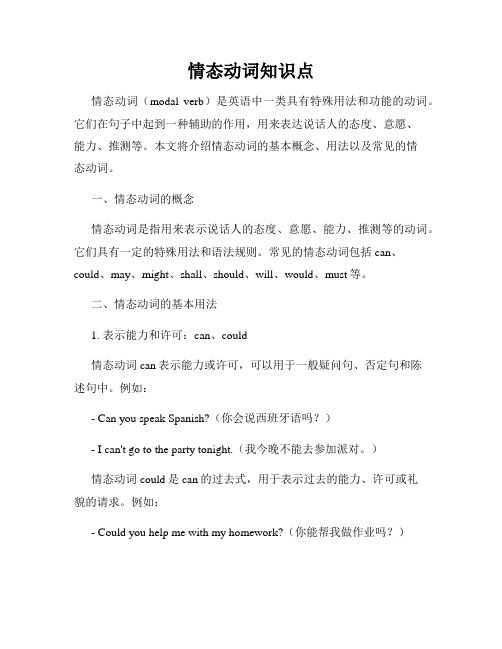
情态动词知识点情态动词(modal verb)是英语中一类具有特殊用法和功能的动词。
它们在句子中起到一种辅助的作用,用来表达说话人的态度、意愿、能力、推测等。
本文将介绍情态动词的基本概念、用法以及常见的情态动词。
一、情态动词的概念情态动词是指用来表示说话人的态度、意愿、能力、推测等的动词。
它们具有一定的特殊用法和语法规则。
常见的情态动词包括can、could、may、might、shall、should、will、would、must等。
二、情态动词的基本用法1. 表示能力和许可:can、could情态动词can表示能力或许可,可以用于一般疑问句、否定句和陈述句中。
例如:- Can you speak Spanish?(你会说西班牙语吗?)- I can't go to the party tonight.(我今晚不能去参加派对。
)情态动词could是can的过去式,用于表示过去的能力、许可或礼貌的请求。
例如:- Could you help me with my homework?(你能帮我做作业吗?)- She could run very fast when she was young.(她年轻时能跑得很快。
)2. 表示可能性和推测:may、might情态动词may和might用于表示可能性或推测,表示事物发生的可能性更大。
might的语气较虚弱,使用较少。
例如:- It may rain tomorrow, so take an umbrella with you.(明天可能会下雨,所以带把伞。
)- He might be busy.(他可能很忙。
)3. 表示义务和建议:shall、should情态动词shall用于第一人称和第三人称中,表示义务或将来的行为。
should用于各种人称中,表示建议或应该的动作。
例如:- Shall I open the window?(我应该打开窗户吗?)- You should eat more fruits and vegetables.(你应该多吃水果和蔬菜。
情态动词总结知识点
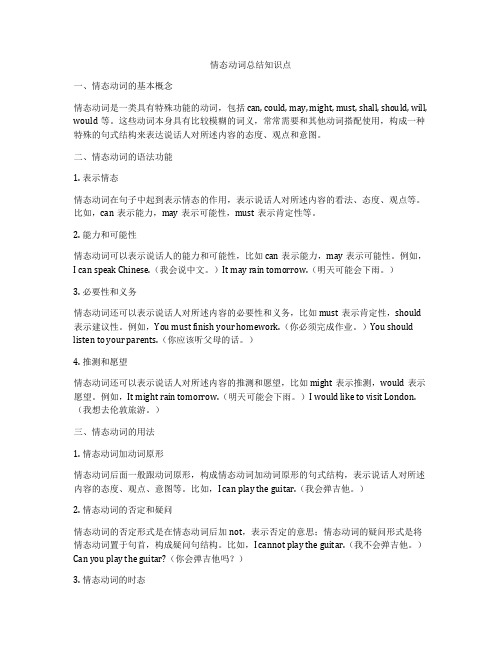
情态动词总结知识点一、情态动词的基本概念情态动词是一类具有特殊功能的动词,包括can, could, may, might, must, shall, should, will, would等。
这些动词本身具有比较模糊的词义,常常需要和其他动词搭配使用,构成一种特殊的句式结构来表达说话人对所述内容的态度、观点和意图。
二、情态动词的语法功能1. 表示情态情态动词在句子中起到表示情态的作用,表示说话人对所述内容的看法、态度、观点等。
比如,can表示能力,may表示可能性,must表示肯定性等。
2. 能力和可能性情态动词可以表示说话人的能力和可能性,比如can表示能力,may表示可能性。
例如,I can speak Chinese.(我会说中文。
)It may rain tomorrow.(明天可能会下雨。
)3. 必要性和义务情态动词还可以表示说话人对所述内容的必要性和义务,比如must表示肯定性,should 表示建议性。
例如,You must finish your homework.(你必须完成作业。
)You should listen to your parents.(你应该听父母的话。
)4. 推测和愿望情态动词还可以表示说话人对所述内容的推测和愿望,比如might表示推测,would表示愿望。
例如,It might rain tomorrow.(明天可能会下雨。
)I would like to visit London.(我想去伦敦旅游。
)三、情态动词的用法1. 情态动词加动词原形情态动词后面一般跟动词原形,构成情态动词加动词原形的句式结构,表示说话人对所述内容的态度、观点、意图等。
比如,I can play the guitar.(我会弹吉他。
)2. 情态动词的否定和疑问情态动词的否定形式是在情态动词后加not,表示否定的意思;情态动词的疑问形式是将情态动词置于句首,构成疑问句结构。
比如,I cannot play the guitar.(我不会弹吉他。
- 1、下载文档前请自行甄别文档内容的完整性,平台不提供额外的编辑、内容补充、找答案等附加服务。
- 2、"仅部分预览"的文档,不可在线预览部分如存在完整性等问题,可反馈申请退款(可完整预览的文档不适用该条件!)。
- 3、如文档侵犯您的权益,请联系客服反馈,我们会尽快为您处理(人工客服工作时间:9:00-18:30)。
中考英语知识点复习专题十一情态动词易错清单1. can与be able tocan和be able to表示能力时用法相同,但can只有原形和过去式(could)两种形式,在其他时态中要用be able to 来表示。
另外be able to 常常指经过努力,花费了时间和劳力之后才能做到某事。
如:Jim can't speak English. 吉姆不会说英语。
He could speak English at 5. 他五岁时就会说英语。
We'll be able to see him next week. 下星期我们将会见到他。
2. can与may(1)can 和may 均可用来征求意见或许可,意为“可以”, 一般可互换使用。
如:Can/ May I help you?我能帮助你吗?(2)can和may 表示可能性时的区别:1)在肯定句中用might,may,must,不用can;2)在疑问句中表示推测用can,不用might,may,must;3)在否定句中用can't(不可能),不用may,must。
如:She may be in the classroom.她可能在教室里。
Where can they be now?他们现在可能在哪儿?That can't be true. 那不可能是真的。
3. may be与maybemay be中的may为情态动词, be为动词原形,在句中作谓语。
而maybe是副词,意思是“大概、也许”,相当于perhaps,常放在句首,作状语。
如:He may be wrong,but I'm not sure.也许他错了,但我也不确定。
Maybe she'll come this afternoon.她可能今天下午来。
4. can't 与mustn't(1)can't 根据其基本用法可译为”不会、不能“。
如:I can't speak English. 我不会说英语。
We can't do it now because it's too dark.天太黑了,我们现在不能干了。
(2)can't在否定句中表示推测,意思是“不可能”。
如:The man can't be our teacher because he is much younger than our teacher. 那个人不可能是咱们老师,他年轻得多。
(3)mustn't 意为“禁止、不许”, 用来表达命令,表示强烈的语气。
如:You mustn't play football in the street. It's too dangerous.你不可以在街上踢足球,太危险了。
5. must与have to(1)must 侧重于个人意志和主观上的必要。
have to 侧重于客观上的必要,可用于现在时、过去时和将来时。
如:I know I must study hard.我知道我必须努力学习。
My brother was very ill,so I had to call the doctor in the mid-night. 我弟弟病得厉害, 我只得半夜里把医生请来。
I don't have any money with me,so I'll have to borrow some from my friend. 我身上没带钱,只好向朋友借点了。
提分策略随着中考试卷越来越重视情境性和交际性,情态动词也就成了中考的热点。
中考常考的知识点有:推测可能性、请求允许等。
题型以选择题为主。
解题时,要注意以下方面:1. 根据句子语气选择情态动词情态动词表示说话人的语气和情感,所以在解答情态动词有关的单选题时,一定要注意说话人的语气,要结合具体的语境来分析和判断。
【例1】(2014·贵州铜仁·30)—Must I water the flowers now,mum?—No,you. You do it later.A. mustn't. mustB. mustn't,mayC. needn't,mayD. needn't,must【解析】考查情态动词的用法。
以must开头的一般疑问句,否定答语常用needn't,表示“不必要”,所以排除A、B两项。
应答句后面一句语气委婉,应该用情态动词may。
故选C。
【答案】 C【例2】(2013·湖南邵阳·27)—Must I hand it in today?—No,you . You can do it tomorrow.A. mustn'tB. can'tC. needn't【解析】考查情态动词的用法。
以Must开头的一般疑问句,否定答语常用needn't,表示“不必要”。
故选C。
【答案】 C【例3】(2013·湖北孝感·30)—Look at the young lady in red. Is it Mrs King?—No,it be her. She is wearing a white dress today.A. canB. mayC. mustD. can't【解析】考查情态动词的用法。
may表示不确定的推测,译为“可能”,谈论可能性;而can 作“可以”讲,表示允许;作“能够”讲,表示一种与生俱来的能力;must则是肯定而有把握的推测;can't意为“不能,不可能”,常用于否定而有把握的推测,由题意可知答案选D。
【答案】 D2. 根据语境选择情态动词情态动词在不同的语境中表示不同的含义,所以解题时要根据具体语境分析句子的意思,选用正确的情态动词。
【例1】(2014·浙江宁波·26)—you leave now? You only arrived here an hour ago.一Sorry,but so much homework is waiting for me.A. MayB. MustC. CanD. Might【解析】考查情态动词的用法。
may可以,可能;must必须;can可以,能够;might可能。
句意:你现在必须走吗?你才到了一个小时。
根据句意应选B。
【答案】 B【例2】(2013·浙江义乌·18)—Mum,can I finish the work tomorrow?—No,you finish it today. Don't put off today's work till tomorrow.A. mayB. canC. mightD. must【解析】考查情态动词的用法。
A项表示“可能,也许”,B项表示“能、会”,C项“may 的婉转形式或其过去式”,D项表示“必须”。
根据句意:“——妈妈,我能明天完成工作吗?——不,你必须今天完成。
不能把今天的事拖到明天。
”可知本题选D。
【答案】 D专项训练1. (2014·江苏扬州·6)—David,is that man your Chinese teacher?—It be him. He's having a meeting.A. mustn'tB. can'tC. needn'tD. won't2. (2014·山东济南·32)Miss Hu's bicycle is blue. So the red one be hers.A. couldB. can'tC. mustD. might3. (2014·上海奉贤区·40)—How often do I need to feed the birds?—They food every day,or they will be hungry.A. must giveB. mustn't giveC. must be givenD. mustn't be given4. (2013·天津)—Excuse me,when are we going to have a picnic?—I'm not sure. Ask our monitor. He know.A. needB. canC. mayD. shall5. (2013·江苏南京)The lady in this photo be over fifty! She looks so young!A. mustn'tB. mustC. can'tD. can6. (2013·山东济南)—I hear you've got a new iPhone 4S. I have a look?—Yes,certainly.A. MayB. DoC. ShallD. Should7. (2013·浙江杭州)—Have you decided which senior high school to choose?—Not yet. I go to Moonlight School.A. mustB. mayC. needD. should8. (2013·河北)—Must we wear our school uniform this afternoon?—No,you . All of us will go on an outing.A. mustn'tB. can'tC. needn'tD. couldn't9. (2013·安徽)—Dad,must I practice the piano today?—No,you . You may do it tomorrow.A. needn'tB. mustn'tC. shouldn'tD. can't10. (2013·湖南长沙)—You be happy with the strong public support you've received. —Yes,you're right. I'm really excited.A. mayB. canC. mustD. need11. (2013·湖北武汉)—Shall we take a taxi?—No,we . It's not far from here.A. can'tB. mustn'tC. shouldn'tD. needn't11. (2013·陕西)—I do the laundry first?—No,you. You can do your homework first.A. Must;mustn'tB. Can;mustn'tC. Must;needn'tD. May;needn't13. (2013·辽宁)School students smoke because it is against the school rules.A. needn'tB. couldn'tC. won'tD. mustn't参考答案与解析1. B解析:考查情态动词的用法。
